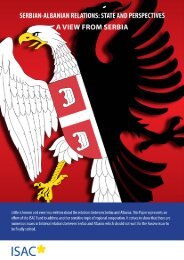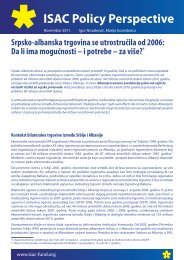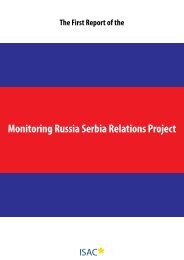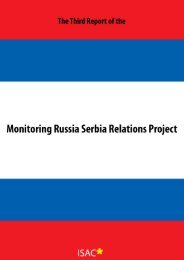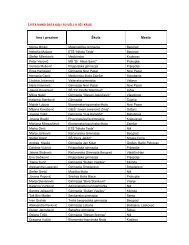the process of security sector reform - ISAC Fund
the process of security sector reform - ISAC Fund
the process of security sector reform - ISAC Fund
Create successful ePaper yourself
Turn your PDF publications into a flip-book with our unique Google optimized e-Paper software.
Narcís Serra TRANSITION TO DEMOCRACY AND MILITARY REFORM: POSSIBLE FRAMEWORK<br />
Narcís Serra TRANSITION TO DEMOCRACY AND MILITARY REFORM: POSSIBLE FRAMEWORK<br />
army instead <strong>of</strong> tackling <strong>the</strong> question <strong>of</strong> police <strong>reform</strong> can be serious for <strong>the</strong><br />
functioning <strong>of</strong> democracy.<br />
There are o<strong>the</strong>r fields <strong>of</strong> <strong>the</strong> administration, normally linked to air and sea transport:<br />
ports, airports, air control, meteorology, etc. It is not such an urgent and important<br />
priority to give <strong>the</strong>m a more civil character. This makes it difficult to achieve<br />
any integrated running and management <strong>of</strong> certain fields <strong>of</strong> <strong>the</strong> administration<br />
and <strong>the</strong>y usually carry connotations linked to prerogatives <strong>of</strong> previous eras, such<br />
as uncontrolled income, and open <strong>the</strong> way for mechanisms <strong>of</strong> corruption in <strong>the</strong><br />
armed forces.<br />
In this period it is also necessary to tackle <strong>the</strong> issue, normally essential for <strong>the</strong><br />
maintenance <strong>of</strong> dictatorial regimes, <strong>of</strong> <strong>the</strong> control <strong>of</strong> information services. There<br />
are no simple or common solutions to this question. It must be pointed out,<br />
however, that linking <strong>the</strong>se activities directly to <strong>the</strong> President <strong>of</strong> <strong>the</strong> Republic is<br />
<strong>of</strong>ten a way for <strong>the</strong> military to achieve autonomy if <strong>the</strong>y continue to direct <strong>the</strong>se<br />
services.<br />
THE SECOND PHASE: DEMOCRATIC CONSOLIDATION<br />
In this phase, we must analyse four tasks which are key to <strong>the</strong> development <strong>of</strong><br />
this phase: <strong>the</strong> elaboration <strong>of</strong> military policy by government, <strong>the</strong> elimination <strong>of</strong><br />
military privileges, <strong>the</strong> evolution <strong>of</strong> <strong>the</strong> concept <strong>of</strong> a military pr<strong>of</strong>ession, and <strong>the</strong><br />
definition <strong>of</strong> <strong>the</strong> new missions to be carried out by <strong>the</strong> armed forces.<br />
Elaboration <strong>of</strong> a military policy.<br />
Here, <strong>the</strong> essential element is what <strong>the</strong> Minister <strong>of</strong> Defence does, as well as giving<br />
<strong>the</strong> Ministry <strong>the</strong> organic structure necessary to carry it out. The civil minister<br />
must be seen as an element necessary for defence policy and for military policy<br />
in <strong>the</strong> present international context. An effort must <strong>the</strong>refore be made to make<br />
sure that his mandate coincides with <strong>the</strong> presidential mandate, and so avoid <strong>the</strong><br />
practice <strong>of</strong> defence ministers whose mandate is so brief that <strong>the</strong>y aren’t allowed<br />
to gain even minimum knowledge <strong>of</strong> <strong>the</strong> situation, let alone take important and<br />
far reaching decisions.<br />
When we say that <strong>the</strong> civil minister must be seen by <strong>the</strong> military as a necessary<br />
element, what we mean is that certain functions, which are absolutely necessary<br />
today, must be underlined, such as his role as arbiter between armies over<br />
differences regarding budget allocations or <strong>the</strong> different focuses given to<br />
<strong>the</strong> doctrine <strong>of</strong> joint action. His work in <strong>the</strong> field <strong>of</strong> international relations, so<br />
crucial today, must also be underlined, whe<strong>the</strong>r with reference to organisations<br />
or bilaterally, vis-à-vis o<strong>the</strong>r countries. O<strong>the</strong>r factors fur<strong>the</strong>r reinforce <strong>the</strong> role<br />
<strong>of</strong> <strong>the</strong> civil minister, such as <strong>the</strong> connection between defence policy and legislative<br />
power. Ano<strong>the</strong>r very important and crucial task <strong>of</strong> <strong>the</strong> civil minister and<br />
his Department is to promote greater awareness <strong>of</strong> military questions among<br />
academics, parliamentarians and journalists, and so stimulate debate on <strong>the</strong>mes<br />
<strong>of</strong> defence in <strong>the</strong> society. Finally, it must also be stressed that <strong>the</strong> civil minister<br />
must undertake <strong>the</strong> task <strong>of</strong> <strong>the</strong> defence <strong>of</strong> <strong>the</strong> legitimate pr<strong>of</strong>essional interests <strong>of</strong><br />
<strong>the</strong> military, in <strong>the</strong> light <strong>of</strong> <strong>the</strong> limitations that exist with regard to <strong>the</strong> rights <strong>of</strong><br />
association and union affiliation <strong>of</strong> <strong>the</strong> military.<br />
Once a civil defence minister has been appointed, <strong>the</strong> second requisite is <strong>the</strong><br />
creation <strong>of</strong> a Ministry with a real capacity for <strong>the</strong> running <strong>of</strong> military policy and<br />
which is, within <strong>the</strong> circumstances <strong>of</strong> each country, more or less on par with those<br />
that exist in consolidated democracies. Latin America provides many examples<br />
<strong>of</strong> <strong>process</strong>es that have been halted precisely at this point, since virtually all <strong>the</strong><br />
Latin American countries today have civil defence ministers, but in <strong>the</strong> majority<br />
<strong>of</strong> cases, <strong>the</strong>y lack <strong>the</strong> administrative means necessary to direct military policy,<br />
i.e., <strong>the</strong>y do not have a real Ministry <strong>of</strong> Defence.<br />
The creation <strong>of</strong> a ministry <strong>of</strong> defence is an arduous <strong>process</strong> <strong>of</strong> overhauling<br />
certain areas <strong>of</strong> decision considered as inherently military territory. For that precise<br />
reason it should be carried out in at least two phases. A first phase would<br />
see to <strong>the</strong> creation <strong>of</strong> an initial nucleus around <strong>the</strong> Minister, on which certain<br />
tasks are directly dependent, such as defence policy, contact with <strong>the</strong> media<br />
and intelligence; as well, a progressive mechanism <strong>of</strong> budget control should be<br />
created. The second phase should establish functional dependence on <strong>the</strong> organs<br />
<strong>of</strong> <strong>the</strong> army vis-à-vis those <strong>of</strong> <strong>the</strong> central apparatus <strong>of</strong> <strong>the</strong> Ministry itself.<br />
Thirdly defence policy must be visibly perceived as <strong>the</strong> policy <strong>of</strong> <strong>the</strong> entire<br />
government, and every opportunity should be taken to show coordination with<br />
foreign policy and o<strong>the</strong>r corresponding <strong>sector</strong>ial policies.<br />
Fourthly, <strong>the</strong> involvement <strong>of</strong> <strong>the</strong> legislative power in <strong>the</strong>se tasks must be guaranteed,<br />
at least in two directions. On <strong>the</strong> one hand, by controlling <strong>the</strong> allocation<br />
34 35





